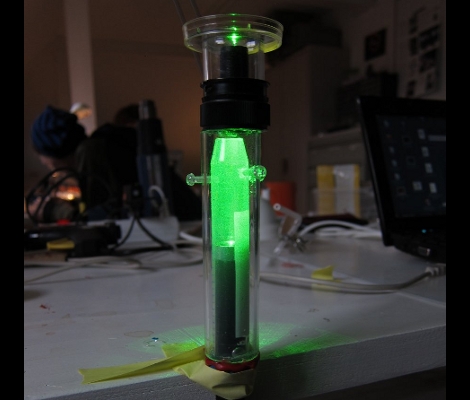
[Dusjagr] has another take on building a laser projection microscope. Last year we saw a laser-based microscope that shined the beam of light through a water droplet which contained the subject to be magnified. The droplet bent the focused beam of light and projected the magnified contents onto a screen. Now that’s pretty neat and [Dusjagr] has used that method himself. But most traditional microscopes use glass slides to contain the subject and this new version now makes that possible.
A bit of experimentation led [Dusjagr] to the discovery that a lens re-purposed from a webcam can achieve similar focus results as a water droplet. The video after the break shows the apparatus seen above in action. The laser shines through the lens, then through a slide that contains a water sample from a nearby pond. The image is clear, albeit completely bathed in green.
For us the most interesting part of [Dusjagr’s] writeup is his discussion of the limits of laser amplification based on the wavelength of light the diode puts out.
[vimeo http://vimeo.com/20472931 w=470]















well you wont catch me drinking pond water again…
@xeracy leave open bottle water for a day and you find same stuff, eggs fly in air everywhere
You can’t fool me! I know a lightsaber when I see one!
Bacteria and other um sized objects can be seen in a visible light microscope. After all, that’s what the common microscope is used for. Optics quality is usually the limiting factor.
so what happens when one leans over the microscope and shines laZ0r right into ones eye?
@Jim Lund:
Technically, this is also a visible light microscope. I suppose you meant _conventional_ visible light microscope.
Holy shit that is scary
I still think someone needs to try this with a UV laser projected onto a glow in the dark surface.
Since the UV laser will charge the phosphors it will act like a photographic plate. Long exposure laser microscopy. :)
If someone tries this, be sure to kill the lights after a short exposure so you can see/photograph the image.
crazy nematodes
I’m guessing that that laser has a low output. Otherwise, wouldn’t it be cooking the sample?
Is the laser nessesary or you could use some conventional strong light source?
If the laser can damage your eye…would it not cause harm to any of the lifeforms in the water sample?